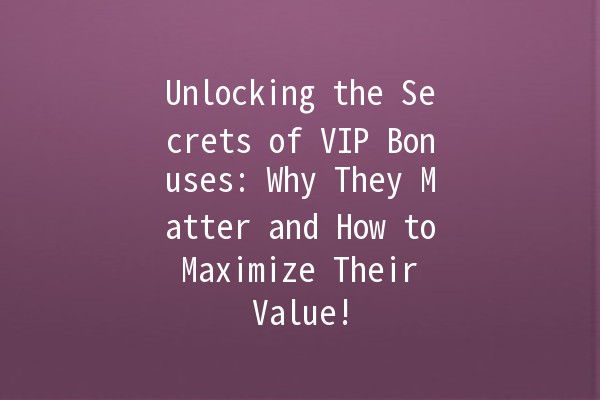In today's competitive landscape, businesses are constantly looking for innovative ways to attract and retain clients. One of the most effective strategies is by offering VIP bonuses, which serve as lucrative incentives for loyal customers. These bonuses, while often seen as a mere promotion, have deeper implications for user engagement and brand loyalty. This article explores the importance of VIP bonuses, how they can enhance user experience, and practical tips for maximizing their value.
Understanding VIP Bonuses
VIP bonuses are special rewards or offers given to individuals who engage significantly with a brand. They may come in various forms, such as points, discounts, exclusive access, or personalized gifts. The primary aim of these bonuses is to create a loyal customer base that feels valued and recognized.
The Psychology Behind VIP Bonuses
The effectiveness of VIP bonuses largely stems from psychological principles. , the principle of reciprocity suggests that when customers feel they have received something of value, they are more likely to give back. This can manifest in higher spend, increased loyalty, and wordofmouth promotion. Additionally, exclusivity plays a vital role: customers appreciate being part of an elite group, which can enhance their overall experience with the brand.
Five Techniques to Maximize the Value of VIP Bonuses
One of the most effective techniques is to personalize the rewards. This requires understanding customer preferences, browsing history, and purchasing behavior. For instance, if a VIP customer frequently buys sports gear, offering them an exclusive discount on new arrivals in that category can significantly enhance their experience.
Example in Practice: An online retail store analyzes a customer's purchase history and finds that they regularly buy running shoes. The store then offers them a personalized VIP bonus of 25% off on running gear, enticing them to make another purchase.

Implementing a tiered reward system can motivate customers to engage more. By creating different levels of VIP status (such as silver, gold, platinum), businesses can encourage customers to spend more to achieve a higher status and associated rewards.
Example in Practice: A loyalty program might offer 5% cashback for silver members, 10% for gold, and 15% for platinum. This structure encourages customers to reach for the higher tiers, increasing overall spending.
Adding an element of time constraint can enhance the perceived value of a VIP bonus. Customers are more likely to act quickly if they know that an offer is available for a limited time.
Example in Practice: An online gaming platform might offer a VIP bonus of double points for purchases made within a specific week. This creates urgency and encourages rapid engagement with the platform.
Offering exclusive access to products, events, or services can create a sense of belonging among VIP customers. This can range from early access to sales, invitations to special events, or even exclusive product lines.
Example in Practice: A luxury brand might invite its VIP customers to a private fashion show, allowing them to shop from the new collection before it launches to the public. This enhances customer loyalty and fosters a deeper connection with the brand.
Another technique to enhance the value of VIP bonuses is to actively seek feedback from these customers. Engaging with them not only shows that their opinions matter but also helps refine the bonus offerings that meet their needs.
Example in Practice: A subscription service could send out surveys to its VIP users asking them about their experiences and preferences regarding bonuses. Based on feedback, the service can then modify or introduce more appealing rewards.
Understanding the Impact of VIP Bonuses on Brand Loyalty
The introduction of VIP bonuses has a profound impact on brand loyalty. They create a loop where customers feel appreciated and recognized, leading to higher retention rates and longterm profitability for businesses. According to research, loyal customers are worth up to ten times the value of their first purchase.
Enhancing Customer Satisfaction
As well as improving loyalty, VIP bonuses can significantly enhance overall customer satisfaction. By providing perks that make customers feel valued, brands can increase the likelihood of repeat purchases and positive reviews.
Closing the Gap Between Customer Expectations and Reality
VIP bonuses often help close the gap between what customers expect and what they actually receive. In today’s market, customers expect personalized experiences, and VIP bonuses are one method to deliver that. If handled correctly, these bonuses can exceed customer expectations and foster a loyal brand following.
Frequently Asked Questions (FAQs) About VIP Bonuses
A VIP bonus is a reward scheme designed to incentivize loyal customers through exclusive benefits, which may include discounts, early access to sales, personalized offers, and more.
Businesses typically analyze purchase history, engagement levels, and spending patterns to identify VIP customers. Criteria may vary from brand to brand.
Yes, they are highly effective. VIP bonuses encourage repeat purchases, increase customer retention, and can even attract new customers due to positive word of mouth.
The frequency of offering VIP bonuses can depend on the nature of the business and customer engagement levels. Regular offerings can keep customers motivated, but they should be strategically planned to maintain exclusivity.
Many businesses use customer relationship management (CRM) systems to automate the administration of VIP bonuses, making it easier to track eligibility and distribute rewards efficiently.
Trends include more personalization, integration with social media platforms, sustainable reward offerings, and increased focus on experiential bonuses such as specially curated events.
By employing these strategies, businesses can effectively utilize VIP bonuses to build strong customer relationships and enhance brand loyalty. As competition grows, ensuring that customers feel valued and recognized will remain an essential element in driving success.